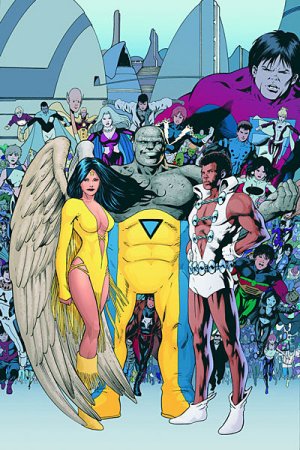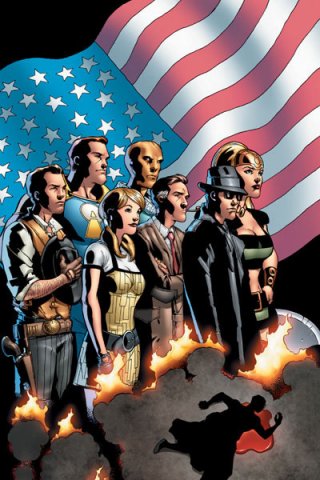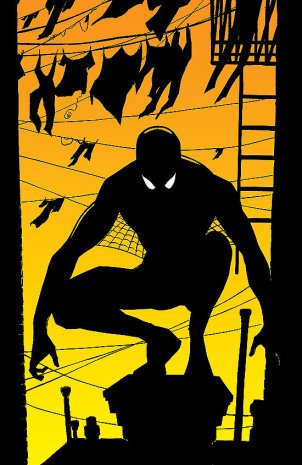|
The
Fanboy Planet Preview Spotlight 02/23/06
brought to you by Brian's Books of Santa
Clara
Each
week we look through the upcoming releases to offer our two
cents as to what's hot and what's not. You can agree with
us or not, but spend your money wisely. The
American Way #1
writer: John Ridley
artist: Georges Jeanty
That 1961, it
was one of the last good years. Kennedy sat in the White
House, Elvis was still the King and Americans just burst
with hope. Part of that hope and optimism came from faith
in the American Way, and in John Ridley and Georges Jeanty's
new book, that faith gets exemplified by the Civil Defense
Corps.
A superteam
that at first glance looks familiar, the Corps shows up
for big disasters, but still finds time to help the little
guy. But Ridley cannily opens the book at a car show - an
event that hints at flash and glitter over substance. The
key thing is to get Americans to buy it, whatever "it" is
that is being sold.
In this case,
American pride. Most of the members have names that tie
in to some U.S. concept. The exceptions seem to be with
the analogs to the three main archetypes: Pharos, Freytag
and Secret Agent, though that last at least is a Western
concept. Though you might spend the first few pages thinking
you've seen them before, it's nice to realize that this
isn't a straight-up Justice League riff.
Nor is it Astro
City. Some of the names have the clever punning to them
that Kurt Busiek has mastered, though it may make one wonder
what the East Coast Intellectual can actually do. Perhaps
he defeats criminals by writing devastating letters to the
New York Times. We'll consider the size-changing Amber Waves
to be a master stroke in naming, though.
The key member,
and the key to the plot, is Old Glory. Dressed like a Revolutionary
War soldier, he shows up when things look their darkest.
When he delivers a key blow, the troops are rallied to defeat
the Nazi Robot/Communist Dragon/Martian Menace.
Ridley could
have simply been mocking the formulaic nature of too many
beloved Silver Age stories, but this is no Silver Age. A
cynical heart beats underneath this story, explaining just
why the beats of a superhero battle follow a set pattern.
Definitely fit for the Wildstorm label, The American
Way (no truth and justice, necessarily) still has a
sense that maybe doing the right things for the wrong reasons
can still turn out right. Wildstorm confuses me so.
It's also packaged
in bright shiny art to match its slightly tarnished vision
of a superpowered superpower. Jeanty has dynamic layouts,
though he frames some of them slightly askew. Perhaps that's
a subtle hint that all is not what it seems to be. He has
a strong, bold style, though not yet with a unique enough
touch to make him stand out.
Let me stress
the yet. Jeanty could very well be one to watch, and as
this mini-series plays out, I suspect that it will ironically
be the quieter moments in which the artist really hits his
stride.
In the meantime,
the book has a nicely skewed vision and strong overall storytelling
that make it worth the time to flip through. Don't be fooled
by its shiny surface; there really is something going on
here.
Runners-up:
The
Amazing Spider-Man #529: The rumors are true. (Okay,
in the age of the internet, rumors are proven all too soon.)
Spider-Man has a new costume. Now that we're past "The Other,"
he seems to have an old attitude. In fact, all changes to
his powers in this issue seem to stem from his suit, not
from the last few months of arachnophobia. Sloppy, maybe,
but more surprisingly, it's likable. As if you couldn't
tell from the banner on the cover (though not on the cover
image Marvel provided online), this helps set up the Civil
War coming to Marvel, and though the event feels a bit forced,
not planned out as far in advance as Infinite Crisis,
it seems logical - and thankfully, interesting.
Batman #450:
Judd Winick may not be the best writer to ever work on Batman;
you don't want to take away all due props to giants like
Denny O'Neill. But Winick has done something that previous
high-profile writers could not convincingly accomplish:
explain why Batman doesn't just kill the Joker once and
for all. This issue also adds even more nuance to the Jason
Todd thing, and though DC has some great writers in store
this title, I think I just might feel the loss of Winick
for a while. He gets the Bat. He really does.
The Book
of Lost Souls #5: Every page by Colleen Doran is lush
and romantic in the classical sense. That alone should attract
readers, because though this series has potential and mysteries
worth exploring, this current two-parter feels just a little
too much like Sandman. It's mostly because of the dark figure
with the teeth in his eye sockets, but it's also hard to
avoid the comparison when J. Michael Straczynski keeps tapping
into that same tortured pretty boy vibe for his protagonist.
But again, with Doran's art, this guy is far prettier
than Morpheus, which might be worth something. Swoon away,
ladies.
Captain America
#15: If you missed the whole Winter Soldier arc out
of protest, you still owe it to yourself to jump on this
issue. Captain America (and Bucky) only appear tangentially,
in glorious chiaroscuro flashbacks. Taking a break from
the longer storytelling, Ed Brubaker re-establishes the
Red Skull's daughter, with a little help from the villainous
Crossbones. They're still evil, but Brubaker does a disturbingly
good job of explaining their motivations.
Green Lantern
#9: Geoff Johns gets about every superhero but
Batman. So I have mixed emotions about this issue, featuring
a Batman who isn't just surly, but tends to be an out and
out jerkwad. Somehow, this is the Bat I expected Judd Winick
to write, which led to his tenure on Batman being
an extra pleasure. Still, Johns keeps adding nice touches
to the Green Lantern mythos, and the strong points of this
run also clearly reflect collaboration between him and his
artist, Ethan Van Sciver. These pencils show Hal in a light
(literally) we haven't seen before, and it works.
 |
Legion of
Super-Heroes #15: It's true. I never thought I would
see Tyroc again. So having him on the cover of Legion
of Super-Heroes would have caught my eye anyway, even
if DC hadn't hyped it. Inside the book, Stuart Moore pens
tales of several different legions, positing them as different
legends. Or perhaps not. With a Crisis looming, who can
say what is actually legend? If these vignettes can be considered
canonical, Moore just opened up a nice little loophole that
will allow for something that (all together now) "…will
crack the internet in half." It certainly made Andy Mead's
brain melt.
Solo #9:
Between issues, I worry that DC will run out of artists
they really deem worth spotlighting. Then a new issue of
Solo comes out and I realize that was a foolish fear.
Scott Hampton paints beautifully, and writes intriguingly.
The weakest point is an EC-style story that tries a little
political commentary, but it's still an amazing art job.
Republicans can still buy it and enjoy.
The Thing
#4: As Dan Slott intended, this book feels like a throwback
to a fun seventies book, but smarter. This is the kind of
comic that enforces the feeling of wonder in the Marvel
Universe, and would have gotten me totally hooked on comics
if I'd picked it up at the 7-11. Plus it features Lockjaw,
thus combining my passion for superheroes with my two-year-old's
passion for puppies. Well played, Slott, well played.
The Warlord
#1: Okay, die-hard fans of Mike Grell's Warlord may
be upset that this concept gets an overhaul. But Bruce Jones
has proven himself adept at sword and sorcery tales over
the years, and this go-round allows for a little more believable
savagery than Grell would have been able to do in an industry
bowing to a stricter Comics Code. Then there's Bart Sears'
art, which has changed into something smoother without losing
any of the energy it had before. If you like Conan
over at Dark Horse, you should pick this one up.
Hey, write to us and
let us know what you think, or talk about it on the
forums!
|








